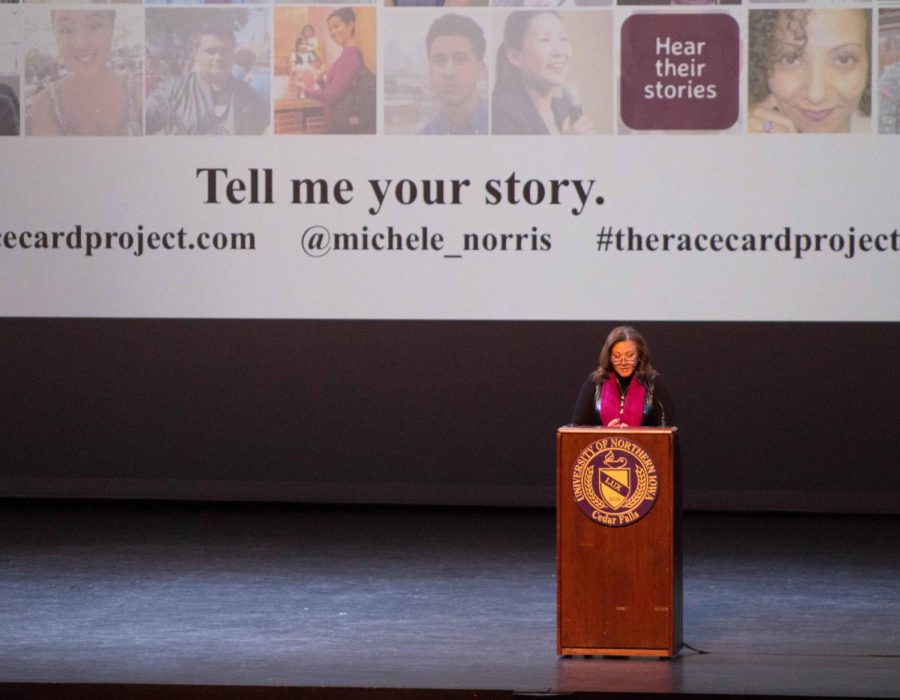Race and identity in six words
Michele Norris, an NPR journalist and author, gave a presentation called the “Race Card Project” at the GBPAC.
Feb 5, 2018
On Tuesday, Jan. 30, National Public Radio (NPR) journalist Michele Norris, host of NPR’s “All Things Considered,” presented the “Race Card Project” at UNI’s Gallagher Bluedorn Performing Arts Center (GBPAC).
“The Race Card Project gives us an opportunity to look at ourselves, examine the messages we have received about race, check out our own thoughts about race and start to have those courageous — or what we call difficult — conversations,” said Chief Diversity Officer and Assistant to the President Gwenne Berry.
“This is a very appropriate way to get people thinking about an issue that we need to think about,” Berry said.
According to The Race Card Project website, the concept of a race card was first conceived in order to start a conversation about race, but Norris discovered that many were willing to talk about such issues, so the race cards quickly morphed from a conversation starter into an epilogue. People from all over the world have sent the six-word notes about their experience with race to Norris, including Chile, South Korea, Belgium and others.
Norris is the founder and director of The Bridge, a program at the Aspen Institute, which focuses on engaging communities through peoples’ stories and experiences with race and identity, according to the Aspen Institute website.
At the beginning of her presentation, Norris expressed her gratitude to UNI for discussing the issues of diversity and inclusion. Norris also noted the difficulty of talking about race and identity and applauded the audience for discussing an uncomfortable topic.
Norris explained that she wasn’t afraid to talk about race, but that she did not want to be the reporter that was always on the race beat. Because she was sometimes the only person of color in her work, she was afraid that race reporting would be too narrow a path to follow — but she said that she was wrong.
She said her idea for her book “The Grace of Silence” was an accident while writing a book on her family. The full concept developed when her interest was piqued by the way Americans talk and think about race.
The presentation was interactive, and audience engagement was a crucial aspect of the event. Norris used the 2008 election as a point of discussion on the idea of a post-racial America.
Norris shared a few family stories during her presentation, including the shooting of her father and her grandmother’s travels teaching people how to make pancakes while dressed as Aunt Jemima. Norris explained that these experiences and others led to a feeling of shame in her family — a shame that she wanted to explore and discuss with others.
She explained that her work in journalism taught her how to be concise, thus producing the idea of six words, with the project moving from postcards to social media, opening the project to more than 250,000 peoples’ stories.
One of the stories Norris told was that of her father’s love of the United States, a love so great that he bought her a pair of American flag print slacks. To her, it showed that her father loved a country that had brought him so much pain.
“What she said about her dad being so proud of the USA that didn’t love him back — this is so real for [people of color], including myself,” said junior public administration major Natalia Estrada. “It is a sad truth that we often are so positive but are struck down with racist stereotypes.”
After sharing a story about someone who was asked to leave someone else’s home because of their race, Norris beseeched the audience to build bridges to others who may have different identities or experiences.
“It made me feel like we have a lot to learn but hopeful that we are able to do it,” said senior study of religion major Katie Thomas. “The vulnerability — not only in sharing part of her family’s story but encouraging us to dig deeper and listen, while calling us out a little bit for not wanting to listen to people that don’t look like us or have different opinions than ours.”









